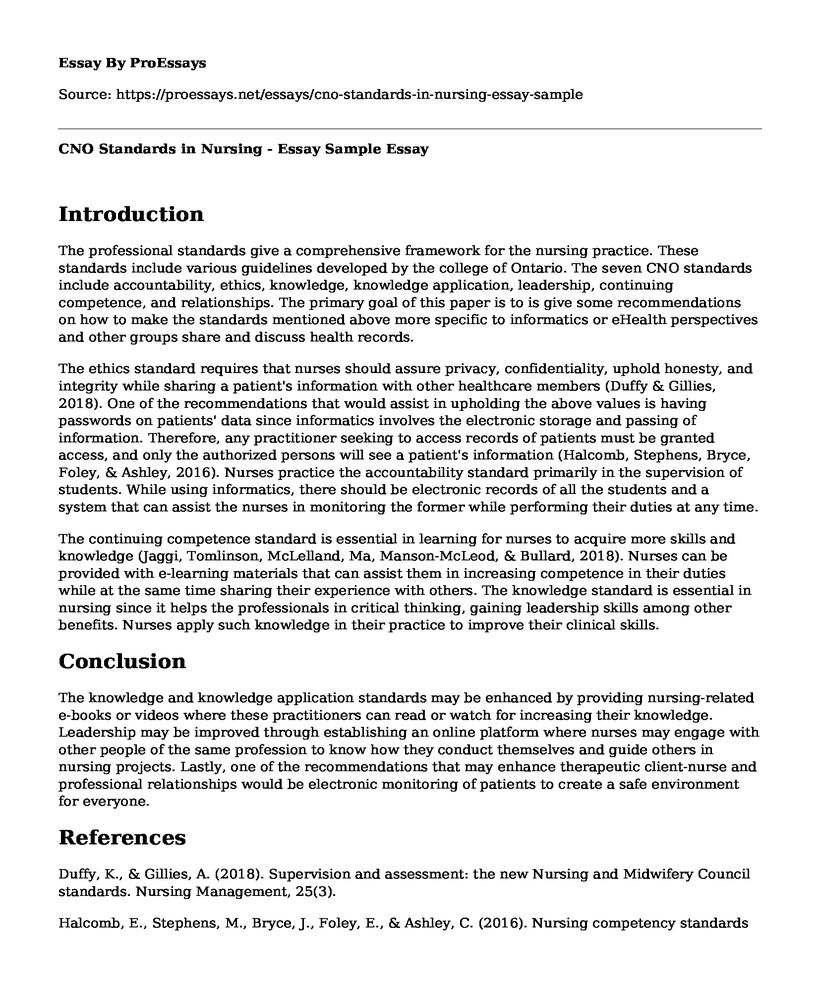Introduction
The professional standards give a comprehensive framework for the nursing practice. These standards include various guidelines developed by the college of Ontario. The seven CNO standards include accountability, ethics, knowledge, knowledge application, leadership, continuing competence, and relationships. The primary goal of this paper is to is give some recommendations on how to make the standards mentioned above more specific to informatics or eHealth perspectives and other groups share and discuss health records.
The ethics standard requires that nurses should assure privacy, confidentiality, uphold honesty, and integrity while sharing a patient's information with other healthcare members (Duffy & Gillies, 2018). One of the recommendations that would assist in upholding the above values is having passwords on patients' data since informatics involves the electronic storage and passing of information. Therefore, any practitioner seeking to access records of patients must be granted access, and only the authorized persons will see a patient's information (Halcomb, Stephens, Bryce, Foley, & Ashley, 2016). Nurses practice the accountability standard primarily in the supervision of students. While using informatics, there should be electronic records of all the students and a system that can assist the nurses in monitoring the former while performing their duties at any time.
The continuing competence standard is essential in learning for nurses to acquire more skills and knowledge (Jaggi, Tomlinson, McLelland, Ma, Manson-McLeod, & Bullard, 2018). Nurses can be provided with e-learning materials that can assist them in increasing competence in their duties while at the same time sharing their experience with others. The knowledge standard is essential in nursing since it helps the professionals in critical thinking, gaining leadership skills among other benefits. Nurses apply such knowledge in their practice to improve their clinical skills.
Conclusion
The knowledge and knowledge application standards may be enhanced by providing nursing-related e-books or videos where these practitioners can read or watch for increasing their knowledge. Leadership may be improved through establishing an online platform where nurses may engage with other people of the same profession to know how they conduct themselves and guide others in nursing projects. Lastly, one of the recommendations that may enhance therapeutic client-nurse and professional relationships would be electronic monitoring of patients to create a safe environment for everyone.
References
Duffy, K., & Gillies, A. (2018). Supervision and assessment: the new Nursing and Midwifery Council standards. Nursing Management, 25(3).
Halcomb, E., Stephens, M., Bryce, J., Foley, E., & Ashley, C. (2016). Nursing competency standards in primary health care: an integrative review. Journal of clinical nursing, 25(9-10), 1193-1205.
Jaggi, P., Tomlinson, R., McLelland, K., Ma, W., Manson-McLeod, C., & Bullard, M. J. (2018). Nursing duties and accreditation standards and their impacts: The nursing perspective. Applied Nursing Research, 40, 61-67.
Cite this page
CNO Standards in Nursing - Essay Sample. (2022, Dec 13). Retrieved from https://proessays.net/essays/cno-standards-in-nursing-essay-sample
If you are the original author of this essay and no longer wish to have it published on the ProEssays website, please click below to request its removal:
- Critical Infrastructure and Key Resources (Cikr) Essay
- The Role of End Users in Incident Reporting Essay Example
- Essay Example on Nurse's Biases and Attitudes Towards Incarcerated Individuals
- Essay Sample on Chronic Sleep Disorders & Sleep Loss: A Global Public Health Crisis
- Angiotensin II: Increasing Blood Pressure & Fluid Retention - Essay Sample
- Essay on Unemployment Soars: 22 Million Americans File Aid Amid Coronavirus Crisis
- Protect Yourself and Loved Ones with Influenza Vaccination - Essay Sample







